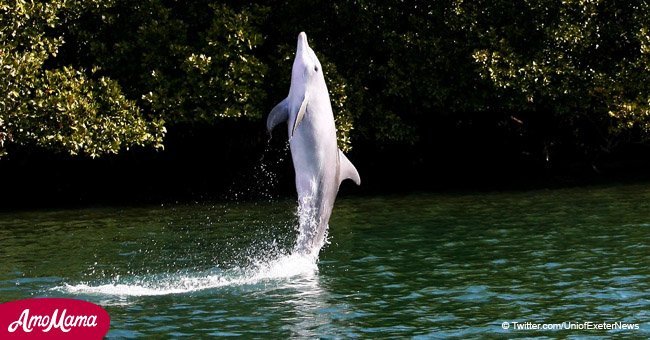
Dolphin once held in captivity teaches wild dolphins to walk on their tails
Billie the dolphin has taught other dolphins off the coast of Australia a special skill she learned from a dolphinarium.
Tail-walking - when an animal rises vertically out of the water and moves forward or backwards across it - is a skill Billie learned by observing the performing dolphins in the dolphinarium.
A 30-year study found that captive animals like Billie have passed on the tricks they've developed to wild dolphins. She continued performing the trick in the wild after he was released.
Tail-walking is a standard part of the routine in almost all dolphinaria, but dolphins rarely do this trick. The most prolific tail-walker died in 2014, around the time that the behavior was also beginning to fade.
Follow us on our Twitter account @amomama_usa to learn more.
Tracking dolphins' behavior for decades
The significance of tail-walking among Adelaide dolphins was recognized because of the research led by the Whale and Dolphin Conservation with the Universities of St. Andrews and Exeter.
Dr. Mike Bossley, lead author of the paper, tracked Billie's behavior and that of other dolphins over an extended period.
"This enabled me to observe tail-walking spread through the community and then its eventual fade away," said Bossley, whose research will be published in the Royal Society's Biology Letters in September.
Based on early findings from the study, released in 2008, the behavior seemed confined to just a small group.
Researchers observed nine dolphins tail-walking in the wild by 2011. In the next three years, the number of dolphins exhibiting the behavior declined.
Important research
"Dr. Bossley's long-term commitment has afforded us a revealing insight into the potential social role of imitation in dolphin communities," said Dr. Luke Rendell, co-author of the study and a researcher from University of St. Andrews.
"Once again we see the power of being able to study cetaceans over extended periods that mean something given their lifespans," added Dr. Rendell, who specializes on researching whale and dolphin cultural behavior.
Recently, a dolphin named Zahar also made headlines but not for positive reasons. He caused a tourist ban in the Bay of Brest, Landevennec area of France because he rubbing up against swimmers because of his "sexual frustrations".
